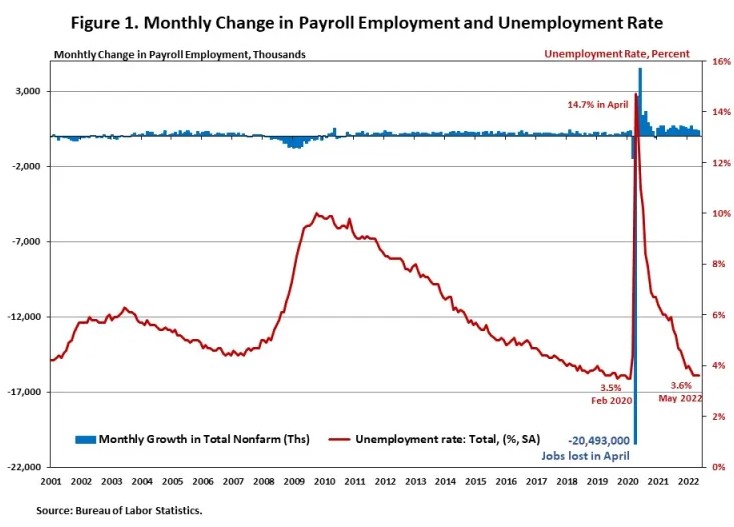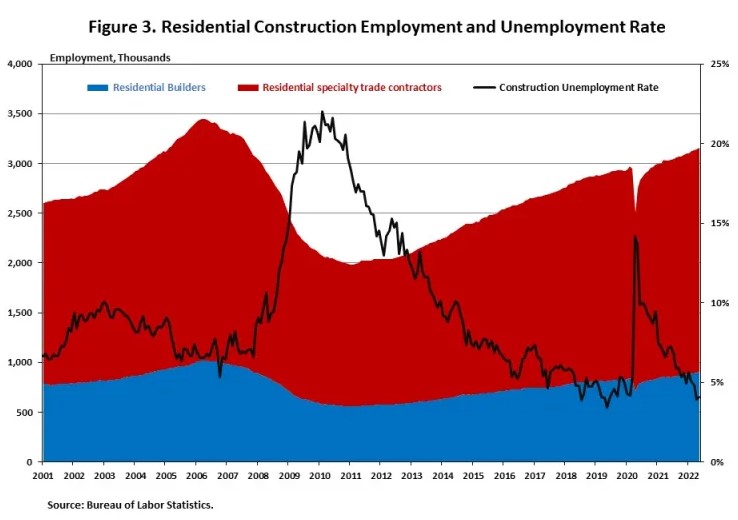Chart: Residential Construction Adds 16.7K in May 2022
Originally Published by: NAHB — June 3, 2022
SBCA appreciates your input; please email us if you have any comments or corrections to this article.
In May, total nonfarm payroll employment increased by 390,000 and the unemployment rate was unchanged at 3.6%. Solid job gains continued in May, despite surging inflation, persistent supply-chain issues, and fears of a possible recession.
Construction industry employment (both residential and non-residential) totaled 7.7 million and has exceeded its February 2020 level. Residential construction gained 16,700 jobs, and non-residential construction added 19,400 jobs in May. Residential construction employment currently exceeds its level in February 2020, while 78% of non-residential construction jobs lost in March and April have now been recovered.

Total nonfarm payroll employment increased by 390,000 in May, following a gain of 436,000 in April, as reported in the Employment Situation Summary. The March estimate was revised down by 30,000 from +428,000 to +398,000, while the April increase was revised up by 8,000 to +436,000. With these revisions, employment in March and April together were revised down by 22,000 from the previously reported ones.
In the first five months of 2022, more than 2.4 million jobs were created, and monthly employment growth averaged 488,000 per month. As of May 2022, total nonfarm employment is 822,000 lower than its pre-pandemic level in February 2020, almost fully recovered from the COVID-19 pandemic.
Meanwhile, the unemployment rate was unchanged, at 3.6% in May. It was 11.1 percentage points lower than its recent high of 14.7% in April 2020 and 0.1 percentage point higher than the rate in February 2020.
The labor force participation rate, the proportion of the population either looking for a job or already with a job, increased 0.1 percentage points to 62.3% in May. The number of persons unemployed was little changed, while the number of persons employed increased by 321,000. The labor force participation rate for people who aged between 25 and 54 increased to 82.6% in May.

Additionally, according to the Household Survey supplemental data, which come from questions added to the Current Population Survey (CPS) since May 2020, 7.4% of employed persons teleworked or worked at home in the last 4 weeks specifically because of the coronavirus pandemic in May, down from 7.7% in the previous month. The share of the employed who teleworked has declined for the past four months. Two years ago, in May 2020, 35.4% of employed persons teleworked because of the coronavirus pandemic.
In May, employment in leisure and hospitality, professional and business services, and transportation and warehousing increased, while employment in retail trade declined by 61,000 over the month, mainly reflecting losses in general merchandise stores (-33,000), clothing and clothing accessories stores (-9,000), food and beverage stores (-8,000), and building material and garden supply stores (-7,000).
Employment in the overall construction sector increased by 36,000 in May, following no change in April. Residential construction added 16,700 jobs, and non-residential construction employment rose by 19,400 in May.
Residential construction employment now stands at 3.2 million in April, broken down as 903,000 builders and 2.3 million residential specialty trade contractors. The 6-month moving average of job gains for residential construction was 12,583 a month. Over the last 12 months, home builders and remodelers added 128,000 jobs on a net basis. Since the low point following the Great Recession, residential construction has gained 1,175,000 positions.
In May, the unemployment rate for construction workers rose by 0.2 percentage points to 4.1% on a seasonally adjusted basis. The unemployment rate for construction workers has been trending lower, after reaching 14.2% in April 2020, due to the housing demand impact of the COVID-19 pandemic.

